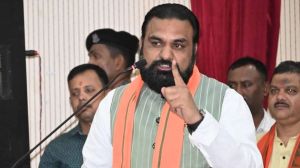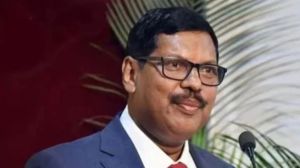P. Vaidyanathan Iyer is The Indian Express’s Managing Editor, and leads the newspaper’s reporting across the country. He writes on India’s political economy, and works closely with reporters exploring investigation in subjects where business and politics intersect. He was earlier the Resident Editor in Mumbai driving Maharashtra’s political and government coverage. He joined the newspaper in April 2008 as its National Business Editor in Delhi, reporting and leading the economy and policy coverage. He has won several accolades including the Ramnath Goenka Excellence in Journalism Award twice, the KC Kulish Award of Merit, and the Prem Bhatia Award for Political Reporting and Analysis. A member of the Pulitzer-winning International Consortium of Investigative Journalists (ICIJ), Vaidyanathan worked on several projects investigating offshore tax havens. He co-authored Panama Papers: The Untold India Story of the Trailblazing Offshore Investigation, published by Penguin. ... Read More
Must be part of solution, says PM, as he sits in global war-room today
For the first time, India will take the international centre-stage tomorrow at a meeting of 45 Asian and European countries...

For the first time, India will take the international centre-stage tomorrow at a meeting of 45 Asian and European countries to share ideas aimed at staving off a prolonged global economic recession. Not ready to risk wiping out the gains made over the last few years, Prime Minister Manmohan Singh landed in Beijing this evening with hopes that the two-day Seventh ASEM (Asia Europe Meeting) Summit will produce solutions to pull the world out of the current morass.
The European Union and the United States increasingly reckon that India and China must be on the negotiating table as serious efforts to reform the global financial system and strengthen the regulatory framework, are made by the West. The two countries will also prominently figure in the mid-November emergency summit of the Group of 20 called by US President George Bush.
French President Nicholas Sarkozy has already taken a lead in inviting China and India to be part of the summit in Washington. Bush is also expected to separately invite the members.
While China said it was actively considering being part of the meet, India has not yet officially responded. But Prime Minister Singh is clear that India must not remain vulnerable to infirmities in international surveillance, supervision and regulatory mechanisms in the future, in what reflects his seriousness of being part of the global reform dialogue.
The two-day ASEM summit, being attended by Singh for the first time, will see 27 countries from Europe and 16 from Asia besides the European Commission and the ASEAN Secretariat. India joined the ASEM during its sixth summit in Helsinki in 2006. The 45 countries represent 51 per cent of the world’s GDP and account for 62 per cent of global trade.
The phenomenal 9 per cent plus growth rate of India over the last three years and the emergence of China as an economic powerhouse over the past decade have dramatically increased their stakes in ensuring that stability is restored in the global economy. Both countries reckon that unless the US and the European Union continue to grow, they will not be able to fully achieve their developmental goals. Though insulated to a certain extent from the US financial crisis that spread like a contagion to Europe, India and China are slowly getting sucked into it. The global financial crisis itself has spilled over to the capital and money markets and is now affecting the real economy. The two Asian economies too have seen their stock markets plummet by over 50 per cent since the crisis broke out.
Soon after landing at Beijing, Singh said, “This is the first time I am attending the Asia European summit as Prime Minister. I sincerely hope that this meeting of minds between Europe and Asia will produce a solution to many global problems including the international financial crisis.”
Together with China and Japan, the three largest Asian economies are expected to emerge as the growth engine for the rest of the world. Singh had on Tuesday said in Tokyo that India and Japan can cooperate in the coming period of global slowdown to devise counter-cyclical strategies to create a new zone of growth in the world.



- 01
- 02
- 03
- 04
- 05





























